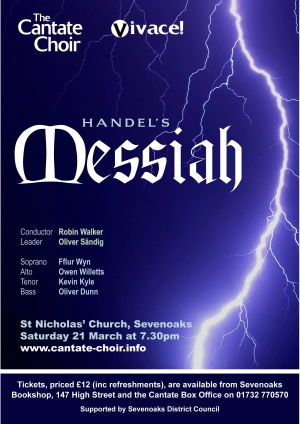
Reviewer – Steve Coles
More often than not in my experience, performances of Messiah catch the unwary out. There are just too many hidden obstacles to surmount and standards these days of period performance concerts seem to get higher and higher. Choice of soloists, that is those singers who are Handelian, choice of cuts and probably most important, and choice of speeds, (for there is nothing worse than a dragging Messiah with endless pause to boot between the items), are three such considerations. Then again one must remember that here is a work that needs much more concert day rehearsal time than time or finances permit.
What strikes me, however, is that on every occasion one hears Messiah, something new comes through, whether it is a certain musical phrase one hears differently or a particular tingle factor moment from a soloist or player and one is never disappointed as one is drawn by the music into that special world when the music makes time stand still.
Having put all these obstacles in the way, The Cantate Choir presented Messiah with four young soloists who gave more than creditable performances and a lively band Vivace! formed to work with them and conductor, Robin Walker, and it was The Cantate Choir who were the stars of the show. Their remarkable attention to detail and nuance must surely rate them as one of the top chamber choirs in the South East, if not farther afield. What they lack in professional timbre, (which for me is often itself a negative point), in fact gives them a quality which remains refreshing from beginning to end.
I must confess a personal interest as provider of the keyboard instruments for the gig but would like to mention Robin Walker’s intuitive harpsichord continuo playing, assisted by the German organist, Martin Knizia, who persuaded me to offer Werkmeister III as the unequal temperament which sat well especially in the more distant keys that Handel uses. The strings and oboes ably sustained their formidable unison passage throughout the work which in itself is far far harder than might seem. Rob Farley’s trumpet always enthrals. I know it is a hard work to play but I really miss the B section, arguably the best few bars of the whole work, and then the potential firework opportunities of the recapitulation, but then something also would have to go!
Singing is probably the most subjective art form there is but for my own taste I found Fflur Wyn and Kevin Kyle’s renderings occasionally rather un-Handelian, surprisingly so as they were both finalists at the London Handel Competition, indeed Miss Winn, who has a most striking voice, was a former winner. The alto Owen Willetts certainly had the most formidable power but seemed to lack the transparent quality that the music so often suggests, whilst the bass, Oliver Dunn, passed the finishing line with flying colours; he was certainly able to cope with the range of the two big contrasting arias that Handel demands.
A capacity audience was not disappointed and it was a pleasure to witness a performance, directed as Handel would have done, from the harpsichord by Robin Walker, who with his team and especially his choir, should be proud of taking us all so ably to that place where time, for a moment, stood still and allowed us to reflect on one of the seven wonders of musical history.
Steve Coles
Artistic Director
Tudeley Festival
